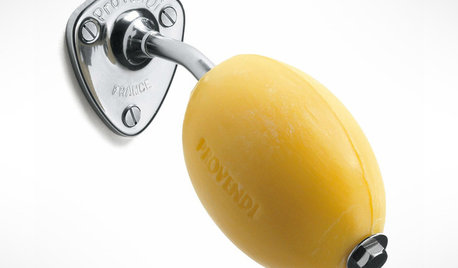Castor Oil
lifesblessings
15 years ago
Related Stories

BATHROOM VANITIESBetter Places to Stash That Soap
Banish gloppy bars and flimsy pumps, and the only things you’ll need to clean are your hands
Full Story
HOUZZ TOURSHouzz Tour: Openness Rules in a Warm, Modern Home
Airy and low maintenance, this home is designed to look great throughout fundraising events, kids' get-togethers and everyday family life
Full Story
KITCHEN DESIGNCoffee Bars Energize Any Room
Love coffee? Wake up to these great designs for a café-style area in the kitchen, guest room and even bathroom
Full Story
KITCHEN ISLANDSInspiring Ideas for Vintage Kitchen Islands
Tired of the same old boxy kitchen island? Look to the past for a functional piece with timeless personality
Full Story
MATERIALSInsulation Basics: What to Know About Spray Foam
Learn what exactly spray foam is, the pros and cons of using it and why you shouldn’t mess around with installation
Full Story
OUTBUILDINGS10 Favorite Shed Features for Comfort and Joy
Make your backyard shed cozier, prettier or more functional with these appealing elements
Full Story
SMALL SPACES11 Design Ideas for Splendid Small Living Rooms
Boost a tiny living room's social skills with an appropriate furniture layout — and the right mind-set
Full Story
DECORATING GUIDESDecorating With Antiques: Chests, Dressers and Buffets
Pretty, practical and versatile, antique chests add history and character along with storage
Full Story
MORE ROOMSDIY: Turn Your Carport Into an Outdoor Dining Room
Paint the Floor and Set the Table for Your Own Parking-Space Party Zone
Full Story
BEFORE AND AFTERSHouzz TV: See Recycled Walls and Cool Cassette Art in a Woodsy DIY Home
Walnut countertops join hardwood floors and pieces made from leftover framing in a bright Spanish colonial
Full StoryMore Discussions






rusty_blackhaw
apollog
Related Professionals
Birmingham Landscape Architects & Landscape Designers · Redondo Beach Landscape Architects & Landscape Designers · Saint Louis Park Landscape Architects & Landscape Designers · Edmond Landscape Contractors · Gainesville Landscape Contractors · Cordele Landscape Contractors · Lynwood Landscape Contractors · Natick Landscape Contractors · Oxnard Landscape Contractors · West Covina Landscape Contractors · Greenfield Landscape Contractors · Folsom Carpenters · Charleston Roofing & Gutters · Orlando Roofing & Gutters · Wood Dale Roofing & Guttersgringojay
rusty_blackhaw
gringojay
gringojay
gringojay
gringojay